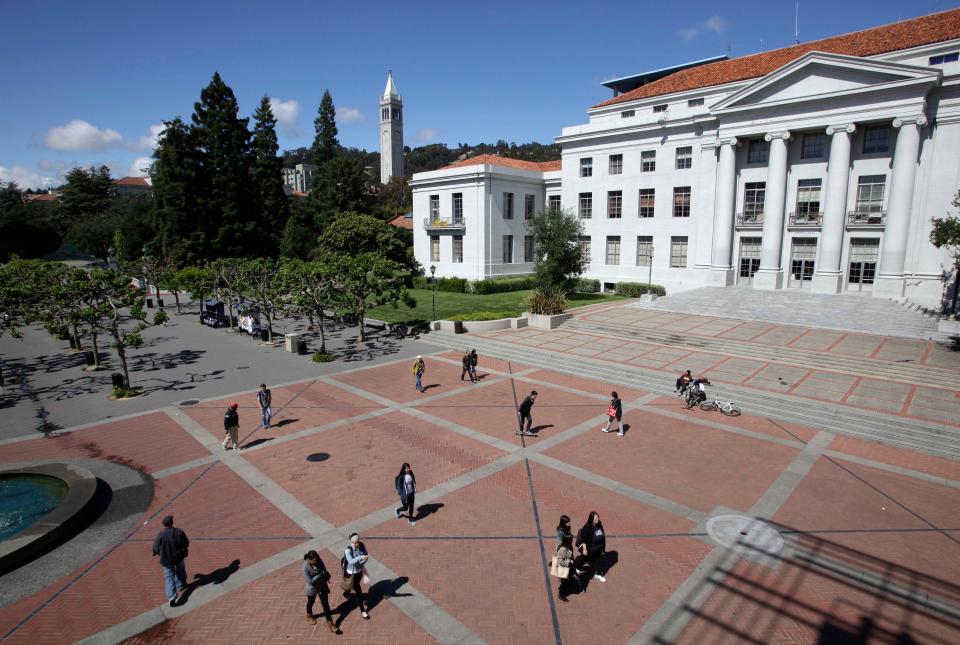Hey Berkeley, violence isn't free speech. Colleges still struggle with antisemitic protests.
You’d think that after the shellacking top college presidents got late last year for their poor response to antisemitism on campus, other college administrators would be standing guard.
Not so.
Two recent troubling incidents at California universities show that too many campuses are still not prepared to do the hard work of protecting all members of the campus community – and making sure all students are given an environment that fosters free expression. There also seems to be a lot of confusion among campus leaders about how to enforce their codes of conduct – and what exactly free speech even is.
A disruptive protest took place at San Jose State University simply because angry students didn’t like the guest speaker’s views on the Israel-Hamas war. The speaker had to be escorted off campus by police.

Last Monday, an event at the University of California, Berkeley featuring Israeli Defense Forces reservist and lawyer Ran Bar-Yoshafat was canceled before it could begin because of violent protests ahead of the event.
That is far from students simply expressing themselves. These mobs took violent action that prevented other students from hearing speakers at peaceful events.
What happened is not free speech.
Violence is 'opposite of speech'
The Berkeley incident was especially egregious. The school where the Free Speech Movement blossomed in the 1960s has taken a dangerous turn.
There were reports of students shouting "intifada," preventing others from entering the venue, breaking glass doors and spitting on students. Others say they were kicked and injured in the melee.
Shameful. https://t.co/fjM28wBcn7
— Ingrid Jacques (@Ingrid_Jacques) February 28, 2024
“We were seeing a lot of violence, and violence is not a form of speech, violence is not extreme speech,” Haley Gluhanich, a program officer at the Foundation for Individual Rights and Expression (FIRE), told me. “It's the opposite of speech, and it's opposite of what higher education is supposed to be all about.”
College and university administrators know that after Hamas’ attack on Israel Oct. 7, the subsequent war in Gaza has been a flashpoint for students. They must be ready to protect students and potentially controversial speakers as well as protests when they are peaceful.
Unfortunately, the violence last week was “rewarded” by the speakers having to flee campus. That will only encourage more such bad behavior – unless administrators offer a swift and strong response.
Opinion alerts: Get columns from your favorite columnists + expert analysis on top issues, delivered straight to your device through the USA TODAY app. Don't have the app? Download it for free from your app store.
Berkeley officials have condemned what happened and said they have launched an investigation. It remains unclear what the final disciplinary action will look like.
FIRE has advocated expelling the students directly involved in the violence, which would send a strong message that such behavior is not tolerated.
A confusing landscape of campus speech
Not all campus violence is punished. For instance, former NCAA collegiate swimmer Riley Gaines was assaulted and essentially held hostage for hours last year after speaking at San Francisco State University. Gaines, who hosts a show on OutKick, has become “controversial” because she stands for women’s rights in sports. She’s used to facing opposition on campuses, but the San Francisco students' reaction was over the top.
Shouted down: 'Triggered' students mob athlete who spoke about women's sports
Yet, almost a year later, the university police finally announced they did not plan to press charges against the students involved.
Gaines was unhappy to say the least. “Whoever is responsible for me being held against my will ... deserves to be held accountable,” she told OutKick.
Yet, universities sometimes overreact to speech that isn’t actual violence. That’s what happened to Cornell junior Maria Lima Valdez in January. Lima Valdez had posted an Instagram story in which she used the words “Zionists must die” in response to news from the Israel-Hamas war.
Strong words: Posting ‘Zionists must die’ is awful. But it shouldn't get student kicked out of college.
That earned her an immediate suspension, and Lima Valdez recently told me she’s still suspended and doesn’t know when she’ll get a hearing. Her appeals have been denied.
She said she wishes she had used different words but feels her punishment has been extreme. Free speech advocates agree that her post didn’t cross the line to a true threat.
“Campuses have to have the highest tolerance for opinions and expression but no tolerance at all for violence,” Gluhanich said.
Ingrid Jacques is a columnist at USA TODAY. Contact her at [email protected] or on X, formerly Twitter: @Ingrid_Jacques.
You can read diverse opinions from our Board of Contributors and other writers on the Opinion front page, on Twitter @usatodayopinion and in our daily Opinion newsletter.
This article originally appeared on USA TODAY: Antisemitism on campus: Berkeley, don't bend to violence
